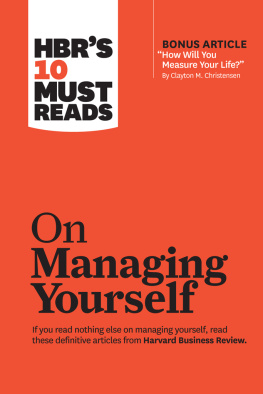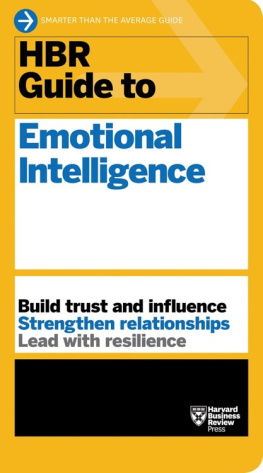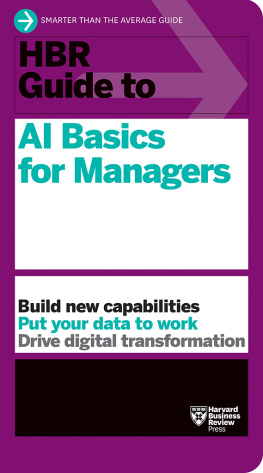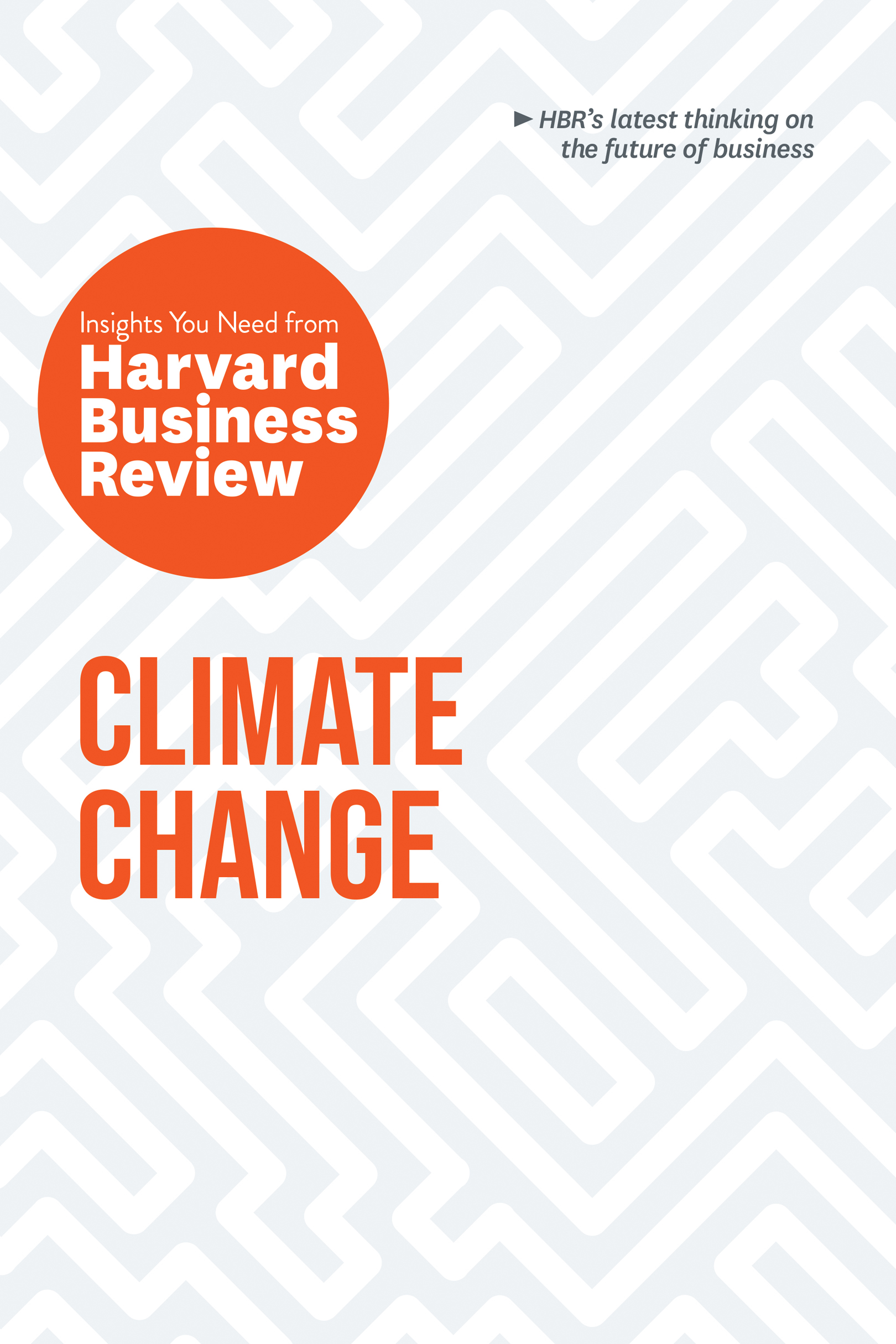Business is changing. Will you adapt or be left behind?
Get up to speed and deepen your understanding of the topics that are shaping your companys future with the Insights You Need from Harvard Business Review series. Featuring HBRs smartest thinking on fast-moving issuesblockchain, cybersecurity, AI, and moreeach book provides the foundational introduction and practical case studies your organization needs to compete today and collects the best research, interviews, and analysis to get it ready for tomorrow.
You cant afford to ignore how these issues will transform the landscape of business and society. The Insights You Need series will help you grasp these critical ideasand prepare you and your company for the future.
HBR Press Quantity Sales Discounts
Harvard Business Review Press titles are available at significant quantity discounts when purchased in bulk for client gifts, sales promotions, and premiums. Special editions, including books with corporate logos, customized covers, and letters from the company or CEO printed in the front matter, as well as excerpts of existing books, can also be created in large quantities for special needs.
For details and discount information for both print and
ebook formats, contact ,
tel. 800-988-0886, or www.hbr.org/bulksales.
Copyright 2020 Harvard Business School Publishing Corporation
All rights reserved
No part of this publication may be reproduced, stored in or introduced into a retrieval system, or transmitted, in any form, or by any means (electronic, mechanical, photocopying, recording, or otherwise), without the prior permission of the publisher. Requests for permission should be directed to , or mailed to Permissions, Harvard Business School Publishing, 60 Harvard Way, Boston, Massachusetts 02163.
The web addresses referenced in this book were live and correct at the time of the books publication but may be subject to change.
Library of Congress Cataloging-in-Publication Data
Names: Harvard Business Review Press.
Title: Climate change : the insights you need from Harvard Business Review.
Other titles: Climate change (Harvard Business Review)
Description: Boston, Massachusetts : Harvard Business Review Press, [2020] | Series: Insights you need | Includes index.
Identifiers: LCCN 2020013972 (print) | LCCN 2020013973 (ebook)
Subjects: LCSH: Climatic changesEconomic aspects. | Social responsibility of business.
Classification: LCC QC903 .C552445 2020 (print) | LCC QC903 (ebook) | DDC 333.71/3dc23
LC record available at https://lccn.loc.gov/2020013972
LC ebook record available at https://lccn.loc.gov/2020013973
ISBN: 978-1-63369-992-2
eISBN: 978-1-63369-993-9
Contents
- Pave the way for a better future.
- by Dante Disparte
- Incremental change is not enough.
- by Andrew Winston
- There should be no haven for pollution.
- by Itzhak (Zahi) Ben-David, Stefanie Kleimeier, and Michael Viehs
- Bring capital to cause.
- by Adam Connaker and Saadia Madsbjerg
- Is using fewer resources enough?
- An interview with Andrew McAfee by Curt Nickisch
- How to respond when customers want less.
- by Thomas Roulet and Joel Bothello
- Reduce your risk by accounting for it in your strategy.
- by Nigel Topping
- Balance the high energy costs of bitcoin and blockchain.
- by Marc Blinder
- Invest in resilience.
- by John D. Macomber
- Anticipate, cope, and adapt.
- by Yvette Mucharraz y Cano
- Join them.
- by Andrew Winston
Introduction
CLIMATE ACTION: THE NEW BUSINESS IMPERATIVE
by Dante Disparte
Climate change demands immediate actionfrom organizations, governments, and society alike. But business leaders often find themselves asking, how? How should companies respond? What steps are effective given operating and financial constraints? What can realistically move the needle for an issue so vast? Will shareholders and other stakeholders forgive potentially inferior returns in favor of global longevity? This last question underscores the fundamental tension between those organizations that want as much as they can have as fast as they can have it and those who want to stretch the economically viable horizon for as long as possible. Climate change should push every leader, every industry, every country, and every person to aim for long-term prosperity.
Against these questions, responses to climate change have often erred on the side of incrementalismor, worse yet, token steps bordering on greenwashing or marketing campaigns. There is good news, though. First, there are real measures leaders can put in place to position their firms (and collectively, the planet) on a path to equilibrium, resilience, and competitive advantage. Second, stakeholders can see through the thin veneer of greenwashing and expect enterprises to rise to the occasion.
In the last 20 years, there have been more disaster declarations in the United States than the preceding 50. The cluster of multibillion-dollar disasters, including Hurricanes Katrina, Sandy, Maria, Irma, and Harvey, were in concentrated areas, showing the link between extreme weather and rising temperatures. Hurricane Harvey, for instance, was the wettest storm in U.S. history, turning Houston, Texas, into a lake. Hurricane Maria triggered the second-longest blackout in history, plunging the U.S. territory of Puerto Rico into six months of darkness and claiming more than 3,000 lives. Californias fire seasons, meanwhile, courtesy of a progressively hotter and drier environment, have worsened each year, with the 2018 Camp Fire being the deadliest and costliest on record, triggering what may be the first climate change bankruptcy of the electric utility, PG&E.
The same pattern holds true around the world, with unprecedented speed and scale. Typhoon Haiyan in the Philippines caused the worst recorded blackout in history, showing how critical infrastructure, as currently designed, can be a single point of failure. Australias record 2019 bushfires caused devastation across the continent, killing over a billion animals and causing some species to go extinct. The last decade has been the hottest in history, which creates an environment where vector-borne diseases, like Zika, will continue their inexorable march north. The threat of communicable diseases and pandemics, like COVID-19, will also thrive in a world where climate change goes unchecked. While climate science and mitigation efforts often focus on large-scale impacts, climate risk is both attritional and acute when it comes to critical infrastructure that keeps the global economy going.
In the face of such threats and catastrophes, the private sector has the wherewithal, ingenuity, and balance sheet to make a material difference. Some businesses are already leading the charge. Clothing companies like Patagonia and H&M have been encouraging customers to use less by repairing clothing, embracing a business model of degrowth. Investors and banks, like HSBC, are looking to offer deals and funding to companies that emphasize sustainability. Other companies have made carbon reduction a priorityand partner with suppliers that do the samein order to align themselves with the Paris Agreement and reach net-zero emissions by 2050.












